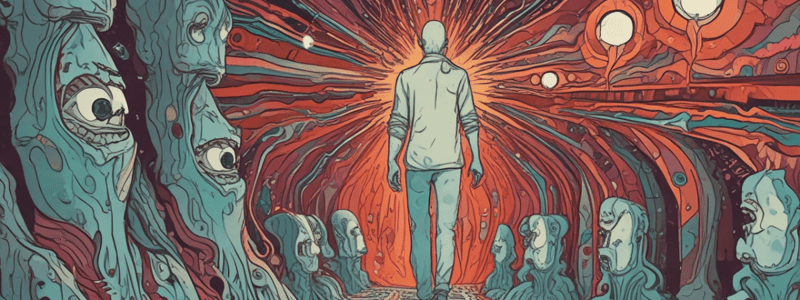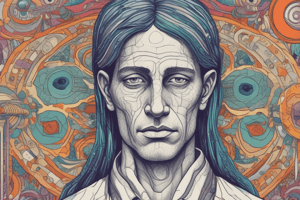Podcast
Questions and Answers
What percentage of patients with schizophrenia are treatment-resistant due to receptor polymorphisms?
What percentage of patients with schizophrenia are treatment-resistant due to receptor polymorphisms?
- 20-30% (correct)
- 40-50%
- 10-20%
- 30-40%
What is the role of glutamate in the negative symptoms of schizophrenia?
What is the role of glutamate in the negative symptoms of schizophrenia?
- Glutamate only affects the positive symptoms of schizophrenia
- Increased glutamate release leads to increased NMDA activation
- Glutamate has no role in the negative symptoms of schizophrenia
- Decreased glutamate release leads to decreased NMDA activation (correct)
What is the primary mechanism of action of dopamine antagonists in controlling positive symptoms of schizophrenia?
What is the primary mechanism of action of dopamine antagonists in controlling positive symptoms of schizophrenia?
- Blockade of D2 receptors (correct)
- Increase of D2 receptor activity
- Blockade of D1 receptors
- Increase of D1 receptor activity
What is the estimated percentage of the population that suffers from schizophrenia?
What is the estimated percentage of the population that suffers from schizophrenia?
What is the primary effect of amphetamine-induced dopamine release in the context of schizophrenia?
What is the primary effect of amphetamine-induced dopamine release in the context of schizophrenia?
What is the role of the pre-frontal cortex in the context of schizophrenia?
What is the role of the pre-frontal cortex in the context of schizophrenia?
What is the primary mechanism of action of 1st generation antipsychotics?
What is the primary mechanism of action of 1st generation antipsychotics?
Which of the following effects of antipsychotics is ameliorated by 5-HT2A antagonism?
Which of the following effects of antipsychotics is ameliorated by 5-HT2A antagonism?
What is the effect of D2 antagonism on cholinergic neurons in the striatum?
What is the effect of D2 antagonism on cholinergic neurons in the striatum?
What is the primary cause of tardive dyskinesia?
What is the primary cause of tardive dyskinesia?
Which of the following is a common endocrine effect of antipsychotics?
Which of the following is a common endocrine effect of antipsychotics?
What is the primary reason for adjusting dosage of antipsychotics on a trial and error basis?
What is the primary reason for adjusting dosage of antipsychotics on a trial and error basis?
2nd generation antipsychotics show selectivity for D1 receptors.
2nd generation antipsychotics show selectivity for D1 receptors.
Antipsychotics that are 5-HT1A agonists/partial agonists can worsen negative symptoms.
Antipsychotics that are 5-HT1A agonists/partial agonists can worsen negative symptoms.
D2 antagonism in the mesolimbic pathway can worsen positive symptoms.
D2 antagonism in the mesolimbic pathway can worsen positive symptoms.
MACh antagonism can improve extrapyramidal motor effects.
MACh antagonism can improve extrapyramidal motor effects.
Tardive dyskinesia can occur early in treatment with 1st generation antipsychotics.
Tardive dyskinesia can occur early in treatment with 1st generation antipsychotics.
H1 antagonism can lead to weight gain and an increased risk of diabetes.
H1 antagonism can lead to weight gain and an increased risk of diabetes.
Schizophrenia affects approximately 5% of the population.
Schizophrenia affects approximately 5% of the population.
Glutamate is primarily involved in the positive symptoms of schizophrenia.
Glutamate is primarily involved in the positive symptoms of schizophrenia.
The dopamine theory suggests that increased dopamine activity is associated with negative symptoms of schizophrenia.
The dopamine theory suggests that increased dopamine activity is associated with negative symptoms of schizophrenia.
Atypical antipsychotics are associated with unwanted motor effects.
Atypical antipsychotics are associated with unwanted motor effects.
Genetic causes of schizophrenia are linked to less than 10 susceptibility genes.
Genetic causes of schizophrenia are linked to less than 10 susceptibility genes.
Neuregulin is not a susceptibility gene associated with schizophrenia.
Neuregulin is not a susceptibility gene associated with schizophrenia.
Flashcards are hidden until you start studying
Study Notes
Antipsychotics Mechanism
- Dopamine receptor antagonists:
- 1st generation antipsychotics show some D2 selectivity
- 2nd generation antipsychotics are highly D2 selective
Dopamine Receptor Antagonism
- In mesolimbic pathway: relieves positive symptoms
- In other pathways:
- Nigrostriatal pathway: motor effects (extrapyramidal)
- Tuberoinfundibular pathway: increases prolactin secretion
- Mesocortical pathway: worsens negative symptoms
5-HTR Interaction
- Antipsychotics interact with 5-HTR, which is beneficial
- 5-HT2A (antagonist) and 5-HT1A (agonist/partial agonist):
- Ameliorate unwanted D2 antagonist effects
- 5-HT2A: Gi/o activation = inhibitory, decreases neuronal excitability and NT release
- 5-HT2A: DAergic neuron
- Antipsychotics are 5-HT2A antagonists
- 5-HT1A: autoreceptor, activation decreases 5-HT release, decreases 5-HT2A activation, and increases DA release
- In striatum and PFC, improves motor effects and negative symptoms
mACh Interaction
- Antipsychotics interact with mACh, which is beneficial
- D2 antagonist: DAergic neuron
- mACh: ACh-ergic neuron
- D2: inhibitory, in striatum, DA has inhibitory effects on cholinergic neurons, decreases ACh
- If D2 is antagonized, increases ACh, extrapyramidal motor unwanted effects
- But some 2nd generation antipsychotics are mACh antagonists
Motor Effects
- Extrapyramidal motor effects:
- Acute dystonias: involuntary movements (spasms), occur early in treatment, decline with time or cessation
- Tardive dyskinesia: involuntary movements (face, tongue, trunk, limbs), occurs after months/years, 20-40% of patients treated with 1st gen, disabling and irreversible
Endocrine and Other Effects
- Galactorrhea: breast swelling, pain, lactation
- D2 activation: decreases prolactin release, median eminence, tuberoinfundibular/tuberohypophyseal pathway
- Antipsychotics: D2 antagonists, increase prolactin plasma
- Other effects:
- Sexual dysfunction: D1/2, mACh, α1
- Drowsiness, sedation: H1, can be beneficial in aggressive patients
- Weight gain, increased risk of diabetes, CV disease: H1, 5-HTR, mACh
Pharmacokinetics
- [Antipsychotic]plasma and clinical effect: highly variable
- Adjust dosage: trial and error basis
Schizophrenia
- Definition: a disorder of the mind that affects how you think, feel, and behave
- Pathways involved:
- Dopamine theory
- Glutamate
- Side effects:
- Positive symptoms: delusions, hallucinations, thought disorder, abnormal behavior
- Negative symptoms: withdrawal, emotional flattening, anhedonia, cognitive defects
Pathophysiology of Schizophrenia
- Tuberoinfundibular: endocrine control, motor control, negative symptoms
- Blunted DA activity: mainly D1
- Overactivity of DA on D2: positive symptoms
Dopamine Theory
- Amphetamine-induced DA release: akin to acute schizophrenic episode
- L-tyrosine, L-dopa, and DA agonists: Parkinson's disease
- TH hallucinations: L-dopa
- DAergic neuron metabolites: DA antagonists control positive symptoms, block amphetamine-induced effects
Glutamate
- Negative symptoms: decreased vesicular glutamate transporter (VGluT), decreased Glu, decreased NMDA activation, decreased DAergic activity
- Positive symptoms: Glu, Glu, GABA, GABAergic neuron
- Glu/GABA: sensory filtering, pre-frontal cortex
- Neurodegeneration: no symptoms in childhood, positive symptoms, negative symptoms, worsening and decreased response to drugs, development of dementia
Studying That Suits You
Use AI to generate personalized quizzes and flashcards to suit your learning preferences.



